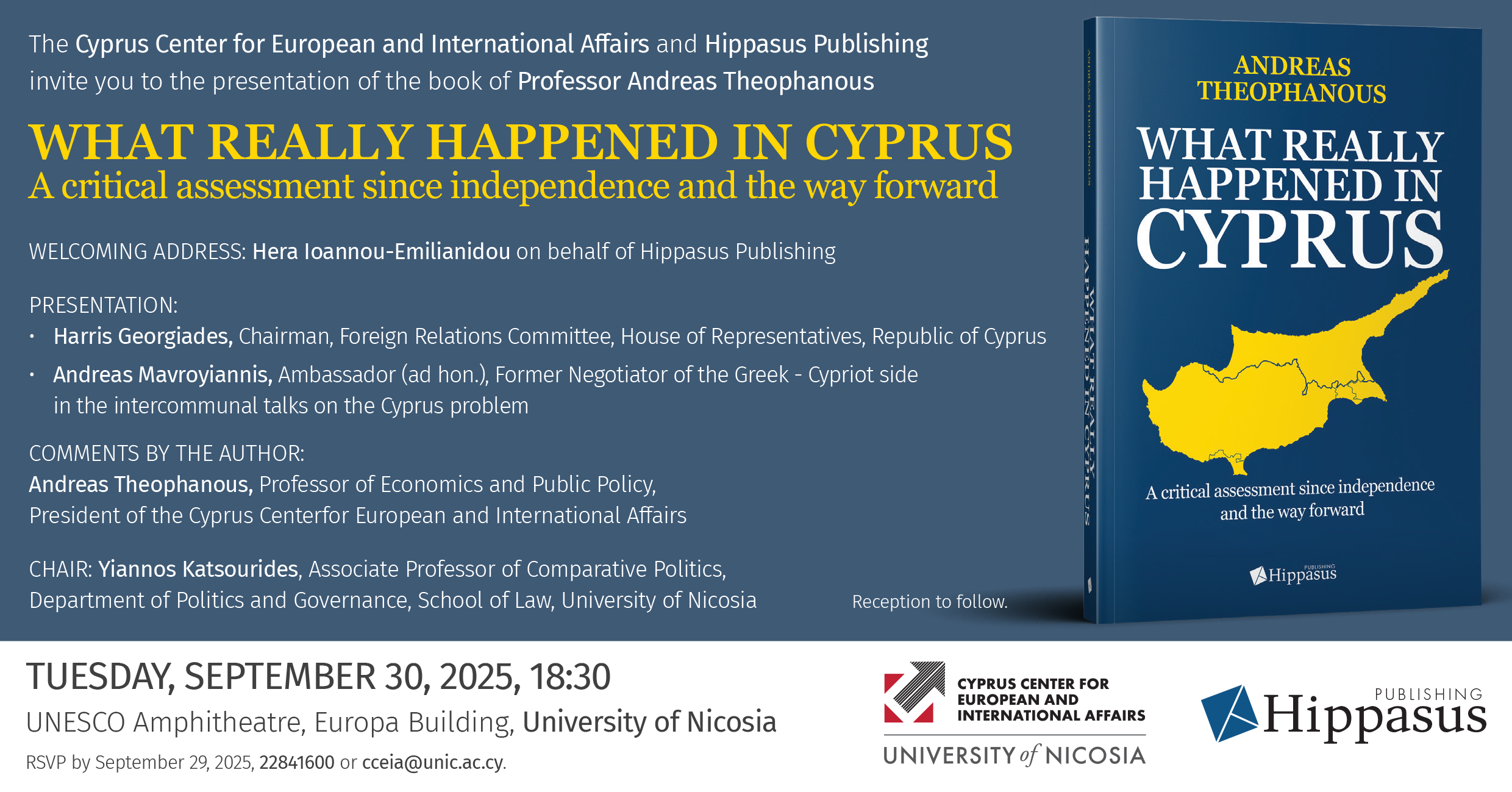On 30 September 2025, the University of Nicosia hosted the presentation of Professor Andreas Theophanous’ new book, What Really Happened in Cyprus - A critical assessment since independence and the way forward (Hippasus Publications). Spanning 353 pages, the volume traces the evolution of the Cyprus problem from 1960 to today, evaluates presidential approaches, and situates Cyprus within shifting regional dynamics. Beyond diagnosis, Theophanous outlines a survival strategy and policy step, from constitutional reform to confidence-building measures; arguing for a pragmatic, evolutionary process that balances international law with realpolitik and aims to restore unity and security.

A critical assessment since independence and the way forward
The new book of Professor Andreas Theophanous entitled "WHAT REALLY HAPPENED IN CYPRUS - A critical assessment since independence and the way forward» (Hippasus Publications, September 2025, p. 353) has just been published. It consists of a Preface, an Introduction, 8 Chapters, a Bibliography, 2 Indices of Names and Terms, and also has 15 Appendices.
The author comprehensively assesses developments regarding the Cyprus problem from 1960 to the present day and makes suggestions for the future. Professor Andreas Theophanous examines how the dynamics of the Cyprus problem have evolved and evaluates the efforts of all the Presidents of the Republic of Cyprus in relation to it. Theophanous also provides a survival strategy and makes concrete policy recommendations. The author points out that there are not many countries where the divergence between the best and worst possible outcomes is so great. Thus,the Cyprus problem is an existential issue. He also considers it essential to have historical self-awareness and a good understanding of the current situation.
After the disaster of 1974, part of those who considered the unitary state as a national compromise were in favor of a bizonalbicommunal federation even when it came in the form presented in the Annan Plan. The others realized the significance of the unified state only retrospectively, when it was no longer feasible.
Andreas Theophanous underlines that the long-term ideologicalframing of the Cyprus problem has been harmful. There wasbigotry, intolerance, emotional reactions, populism and a lack of pragmatism, which inevitably led to disastrous results. Even today there are still similar attitudes albeit to a lesser extent. With the same rationale, the author underlines that the insufficient utilization of scientific expertise by various decision-making centres in Cyprus and Greece has led to problematic outcomes. Unfortunately, this is still the case today.
After 1974, there has been no solution to the Cyprus problem because of Turkish maximalism and not because of the long-term struggle which in reality has never been carried out. The Republic of Cyprus and Cypriot Hellenism are facing existential threats. Hence, there is an imperative necessity for a survival strategy that should be based on a concrete narrative. There have been several proposals and plans since 1974, however, the majority of Greek Cypriots believed that their implementation would worsen the status quo. In addition, Turkey would only accept a plan that aligns with its major objective - the strategic control of Cyprus.
The author further analyzes the current situation in Cyprus in light of wider geopolitical developments. Within this framework, he assesses the similarities and differences between the cases of Cyprus and Ukraine, as well as the differences in the approaches of the EU, the UN and other powers. The author evaluates the importance of International Law and Realpolitik in International Relations and critically examines the responsibilities of the guarantor countries as well as the role of other actors.
Taking into account all the aspects of the current situation, Andreas Theophanous briefly describes the implementation of several scenarios for the solution of the Cyprus conflict. He concludes that in today's circumstances it will be difficult to find a viable solution which improves the status quo. However, if the goal is to restore the unity and territorial integrity of Cyprus, it is necessary that a comprehensive strategy includes this crucial dimension as well. This is another reason that makes an evolutionary process the only strategic option.
Cyprus should become a model state for the Eastern Mediterranean and the wider region. Such a development will strengthen a network of interests which will have as its centre the Republic of Cyprus. Andreas Theophanous emphasizes the need to adopt a new approach to the Cyprus problem based on pragmatism, as well as the correct evaluation of geopolitical dynamics and scientific analysis of the events.
This book fills a large gap in the English literature. Beyond the historical and political evaluation, Andreas Theophanous presents specific suggestions for the future. They include, among others, major proposals for the revision of the 1960 constitution in order to create a modern and well-functioning federal state, as well as significant confidence-building measures and other forms of cooperation aimed at overcoming mutual distrust between the two communities. The author’s proposal also highlight the role of the guarantor countries, the EU and of other powers. These should be undertaken through an evolutionary process. No less important is the methodology he adopts, as it allows for the further enrichment of propositions for the future.
The book is also available at the office of the Cyprus Center for European and International Affairs. Each copy costs €25. As already announced, the presentation took place on Tuesday, September 30 at 18:30 at the University of Nicosia. The book was presented by the Chairperson of the Committee on Foreign and European Affairs of the House of Representatives Mr. Harris Georgiades and the Ambassador (ad hon.), Former Negotiator of the Greek Cypriot side Mr. Andreas Mavroyiannis. Also, the Head of Hippasus Publishing, Ms. Hera Ioannou-Emilianidou, delivered a welcoming address, and introductory comments were made by the Associate Professor Dr. Yiannos Katsourides, who coordinated the event.
